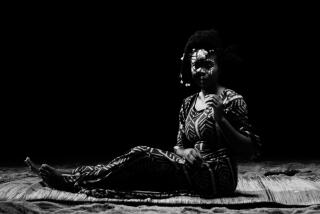World Music : King Sunny Ade’s New Album Shows He Hasn’t Lost Touch
- Share via
When King Sunny Ade and his colorful band of players rev up their eclectic array of talking drums, Western-style percussion and pedal steel and electric guitars, the music delivers an exhilarating connection between traditional Nigerian culture and contemporary pop. The power of their juju music is so strong that occasionally, when the music and audience reach a synergistic peak, enthusiastic fans rush to the stage to place coins and bills on the players’ sweating foreheads.
The practice, which is called “spraying,” according to Ade, revives an ancient custom.
“In the olden days,” he explains, “when a king placed a coin on your forehead . . . that was the sign of a great performer. People are using it now because they appreciate your music . . . the way you perform on stage.”
Although Ade has produced dozens of albums in the African musical hotbed of Lagos, Nigeria, he is known in Europe and North America for a relatively few but extremely influential albums. And his Island Records releases of the early ‘80s played a significant role in bringing world beat music into mainstream Western pop.
The music on those albums expanded the horizons of juju, an evocative blending of Yoruba drumming, call-and-response vocals, layered guitar lines and interjected talking drums that had been evolving in Nigeria since the ‘50s. In Ade’s hands, the irresistible rhythms and catchy melodies swept Nigerian pop music, then moved onto the international stage.
But when a decade went by without a studio recording by Ade released in the United States, some observers wondered whether Ade’s focus on his many entertainment business ventures in Nigeria had irretrievably removed him from the world music scene.
Not so. “E Dide,” just released on Mesa Records, makes one wonder why he waited so long to come back. All the familiar Ade elements are present, with the addition of female back-up singers and percussionists. (Ade, who plans to tour the United States in the spring, insists that his band is the first juju ensemble to allocate such roles to women.) The rolling rhythms, the extraordinary sounds of the talking drums driving in and around the smoothly harmonized vocals, the sudden, oddly out-of-context zing of the steel guitar typify world beat at its mesmerizing best.
This is not roots music. One of the artful aspects of Ade’s music, in fact, is his willingness, even eagerness, to incorporate anything that he feels will enhance the emotional effect of his musical messages of peace, love and respect.
Also on Record: China has not exactly been a center of musical heterogeneity in many years. But a new recording, “Sister Drum” (Elektra), showcasing a remarkable young Tibetan singer named Dadawa (or Zhu Zhequin) reveals that, at the very least, a few ears in China are open to international sounds. Dadawa, 25, performing compositions by producer-composer He Xuntian, sounds a lot like an Asian Enya in works that place her ethereal voice above dense, atmospheric synthesizer textures.
Yet another brief sidebar in Jerry Garcia’s long strange trip is revealed in “Blue Incantation.” In it, the recently departed guru of the Grateful Dead tries his hand at a union of Indian music and blues and rock guitar in a collection of compositions by Sanjay Mishra for acoustic guitar, tablas, frame drums and bass. Much of it is fascinating, with Garcia peering into realms of his talent that rarely emerged in his work with the Dead.
On the Airwaves: KUSC-FM (91.5) has three excellent continuing shows devoted to world music. Tuesdays at 8 p.m., “Concierto Latinoamericano,” with host Enrique Gonzalez Medina, offers a bilingual presentation of classical music of the Americas. On Thursdays at 8 p.m., Titus Levi explores a wide set of musical linkages from around the world on “Songs of the Earth.” And “Thistle and Shamrock,” hosted by Fiona Ritchie on Saturdays at 8 p.m., displays the ever-changing tapestry of Irish and Celtic music.
Around Town: Mexican Lebanese singer Astrid Hadad has been compared to Diamanda Galas, Janis Joplin and Bette Midler, and it probably wouldn’t be inaccurate to add Laurie Anderson to the list. She performs an assortment of material described by the Village Voice as “outrageous, purgative, high comedy,” Jan. 21-22 at LunaPark.
Moroccan gnawa musician Hassan Hakmoun, one of several North African musicians who are dabbling in fusion blends, appears at the House of Blues on Jan. 22 with percussionist Adam Rudolph.
More to Read
The biggest entertainment stories
Get our big stories about Hollywood, film, television, music, arts, culture and more right in your inbox as soon as they publish.
You may occasionally receive promotional content from the Los Angeles Times.







